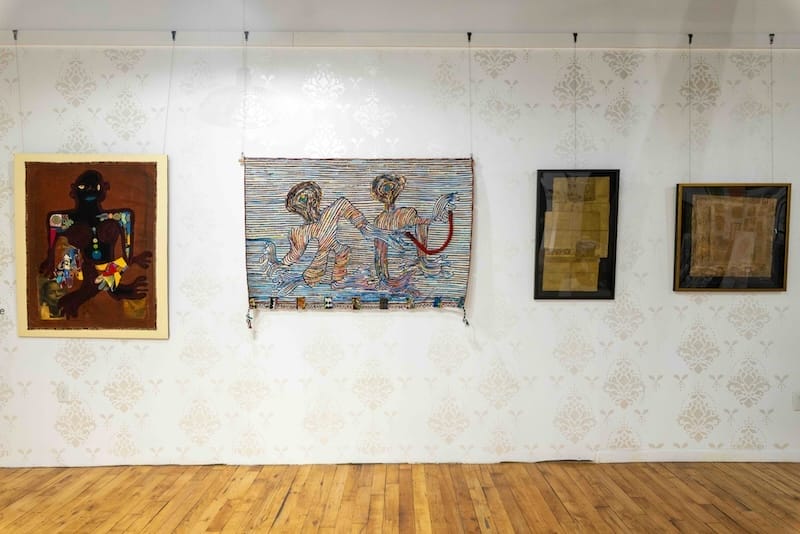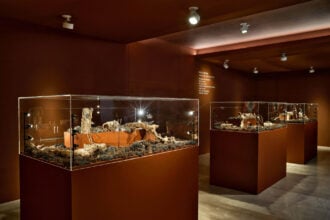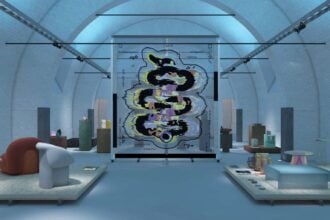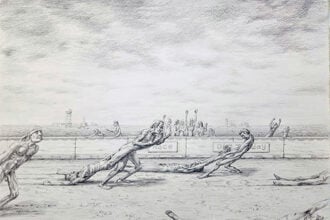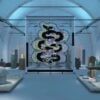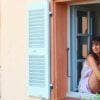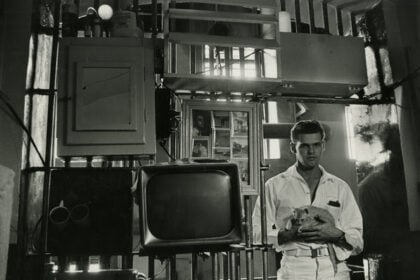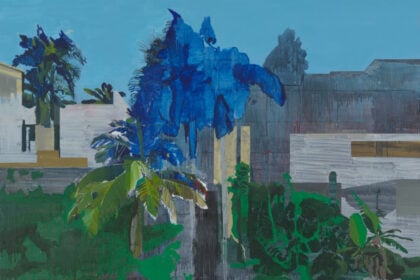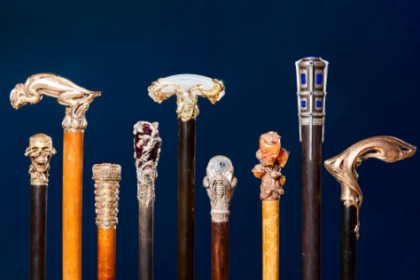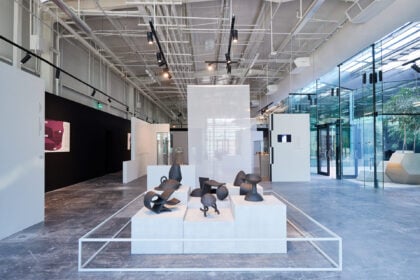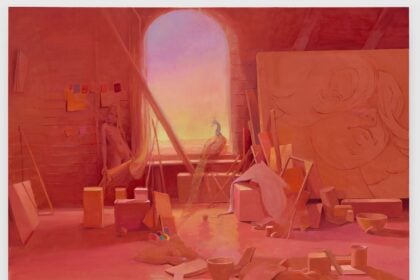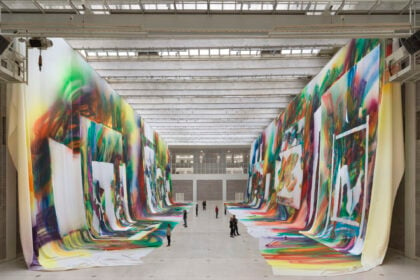Washington, D.C. – Morton Fine Art is pleased to announce Knit, Restored, Woven, Healed, a global group exhibition of fiber art exploring overlapping themes of healing, reclamation, finding and being found. The exhibition features work from artists Kesha Bruce (USA), Lizette Chirrime (Mozambique), Maliza Kiasuwa (Belgium and Kenya), and Adia Millett (USA). Bringing together fiber art from these four female artists working across three continents, Knit, Restored, Woven, Healed is animated by a belief in renewal, healing and meaningful materiality. “While my work pays homage to the past through the use of repurposed fabrics and historical iconography, its bright atheistic imagery looks to, and is informed by the future,” shared Millett. “It reminds us of the importance of renewal and rebuilding, not only through the artistic process but also through the possibility of transformative change.” Knit, Restored, Woven, Healed will be on view from May 24 – June 26, 2024 at Morton’s Washington, D.C. space (52 O St NW #302). An opening reception will be held June 1, 2-4 pm.
Continuing techniques practiced by their ancestors, Chirrime and Kiasuwa work with resonant materials that speak to the past while enabling the past to speak to the present. Rest and physical and spiritual healing are their desired outcomes. Mozambican artist Chirrime sources scrap materials from her environment and immediate communities, using fabric, thread, rope, paint, stitches and more to produce dynamic collages that speak to African womanhood and the human condition. Chirrime’s interplay between textiles and abstraction, self and the universe, discarded and repaired, evokes a reciprocal world of self and other. “I use fabric to create works as a form of self-healing,” Chirrime says. “And simultaneously to heal the Universe.” Chirrime’s use of art as a therapeutic and spiritual tool creates a reconfigured understanding of representation and human nature, using thread after colored thread to inspire hope and healing.
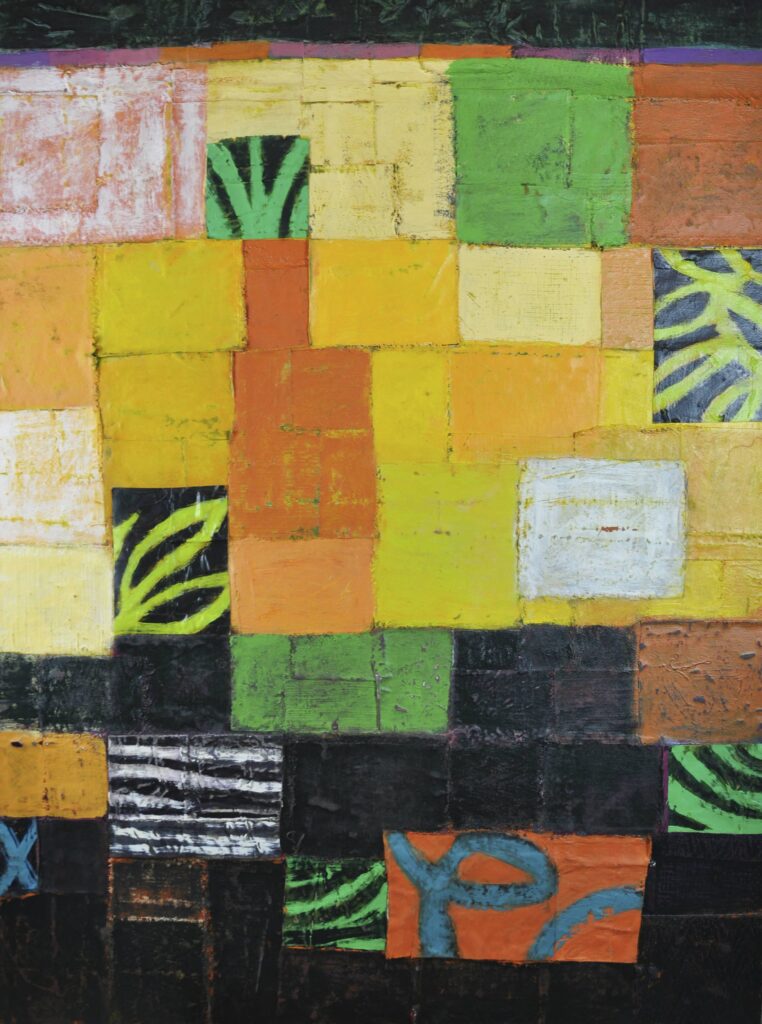
Lagoon, 2022
Mixed media textile collage on canvas
48 x 36 in.
Another artist with a longstanding practice rooted in found objects and the histories that inscribe them, Kiasuwa uses thread to stitch disparate materials into an interlacing dialogue. “Fiber art is inherently suited to themes of growth, renewal, rebuilding and change,” shares Kiasuwa. “The nature of fibers, which can be twisted, woven and stitched together, reflects the connection and resilience found in life. Each thread, while fragile on its own, becomes strong and supportive. The versatility of fiber allows for constant experimentation and evolution. I can dye, print, cut, and manipulate fibers in endless ways, reflecting the dynamic nature of change and transformation.” Kiasuwa’s works often simultaneously depict and simulate a vision of exchange between parties that—while possibly dissonant in material—are imbued with a sense of harmony and dignity in form. As a visual artist of European and African descent, Kiasuwa brings a
panoptic perspective to her border-crossing work, which regards the coexistence of two worlds as an endless source of inspiration, and a potential space for reconciliation.
An exhibiting artist for over 25 years, Bruce has steadily oriented her craft toward capturing and encouraging the process of artmaking as an end in its own right. An intuitive combination of painting, collage and textile art, Bruce’s work represents the culmination of a holistic creative practice developed by the artist over several decades, often addressing themes of life, renewal and healing. “So many of the materials I use in my work have magically found their way to me.
Years ago I think I was more concerned with what it meant to use found materials or created or store-bought materials, but now I’ve just completely surrendered to the idea of letting objects, fabrics, materials find me,” said Bruce. Referred to by the artist simply as paintings, her
mixed-media compositions are in fact patchworks of painted fabric, individually selected from Bruce’s vast archive and pasted directly onto the canvas in a textile collage that can sometimes resemble a quilt. The result of a slow and perpetual artistic method, each work represents hours of treatment, selection and juxtaposition until the whole becomes manifestly greater than its parts. Bruce’s process ends with her titling of each work: a poetic articulation of what the work is at this point capable of expressing for itself.
Millett’s work weaves threads of Black American experiences with broader ideas of identity and collective history, suggesting the fragile interconnectivity among all living things. Constructing works assembled from vibrant and textured fragments to fashion a meaning greater than its individual elements, Millett illuminates the multidimensional parallels between the creative process and personal identity. Her textiles, which draw on the domestic and artistic traditions of quilt-making, piece together to combine culturally diverse, often repurposed fabrics and historical iconography.
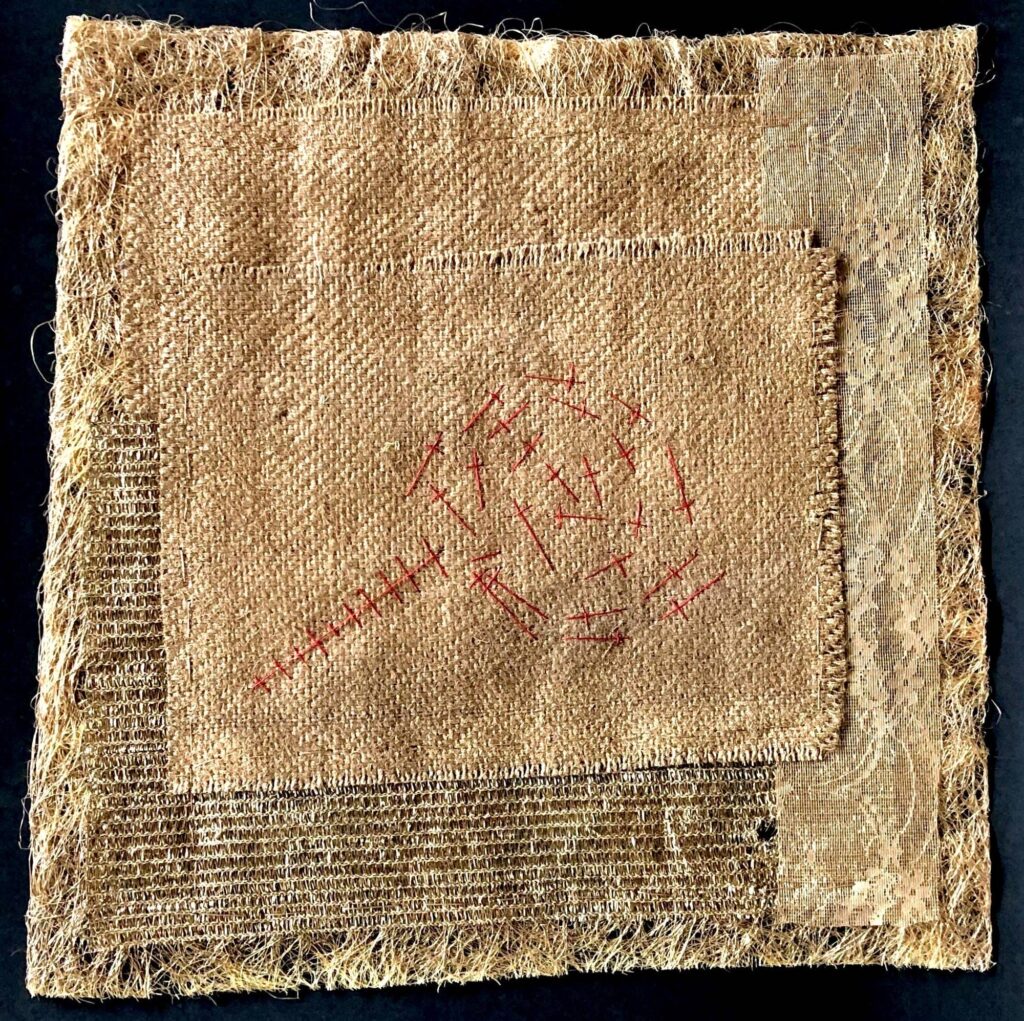
Gold Bold, 2022
Hessian, fabric, paper and stitches
23.5 x 23.5 in.
Morton Fine Art
Founded in 2010 in Washington D.C. by curator Amy Morton, Morton Fine Art (MFA) is a fine art gallery and curatorial group that collaborates with art collectors and visual artists to inspire fresh ways of acquiring contemporary art. Firmly committed to the belief that art collecting can be cultivated through an educational stance, MFA’s mission is to provide accessibility to
museum-quality contemporary art through a combination of substantive exhibitions and a welcoming platform for dialogue and exchange of original voice. Morton Fine Art specializes in a stellar roster of nationally and internationally renowned artists as well as has an additional focus on artwork of the African Diaspora.
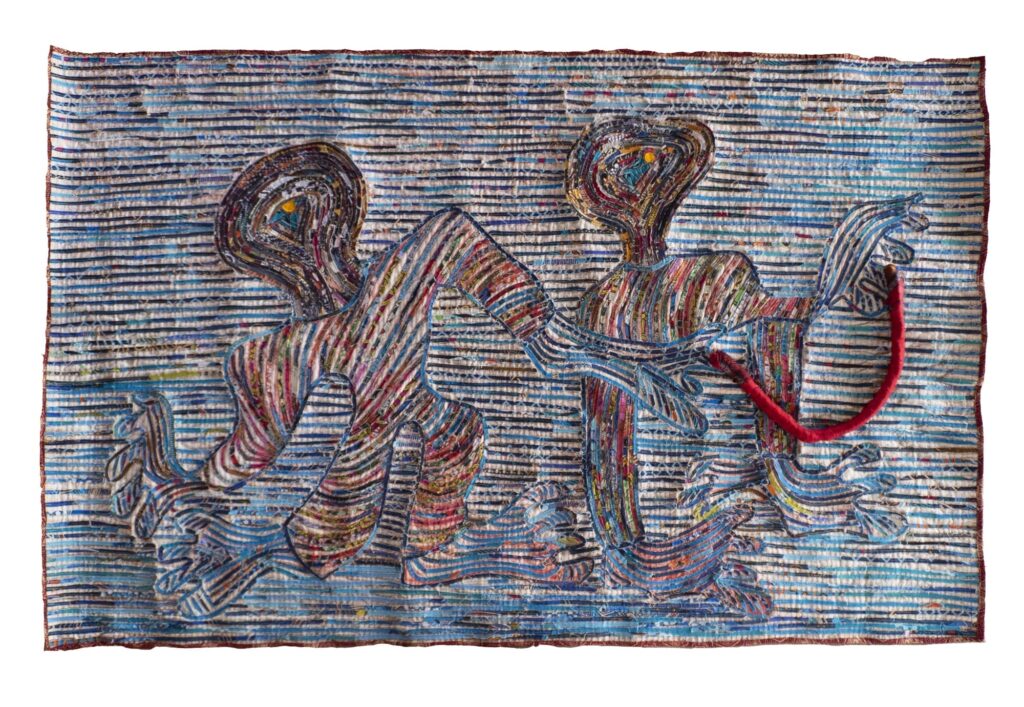
Synchronization in the Blood, 2022
Fabric and mixed media stitched on canvas
38.5 x 60.5 in.
Kesha Bruce (Arizona b. 1975, Iowa). Born and raised in Iowa, Bruce completed a BFA from the University of Iowa before earning an MFA in painting from Hunter College in New York City. Bruce has been awarded fellowships from the New York Foundation for the Arts (NYFA), The Vermont Studio Center, The CAMAC Foundation and the Puffin Foundation. Her work is included in the collections of The Smithsonian Museum of African American History and Culture (14 pieces), The Amistad Center for Art and Culture, The University of Iowa Women’s Center, The En Foco
Photography Collection and MOMA’s Franklin Furnace Artist Book Collection. She has been represented by Morton Fine Art since 2011.
In addition to her studio practice, Bruce has been the Artist Programs Manager at the Arizona Commission on the Arts since 2019. She also serves as the Board Chair of Tessera Art Collective, a non-profit organization that supports and elevates the work and practices of BIPOC women artists working in abstraction. Bruce is also co-founder of Black Girl Basel – the only event during Miami Art Week intentionally created for Black women artists, creatives, entrepreneurs, activists and cultural change-makers.
Lizette Chirrime (Inhambane, Mozambique b. Mozambique) creates intricate fabric collages on canvas that are at once celebratory and soul-stirring, as the artist flirts between figuration and abstraction to develop a unique—and distinctly African—visual language. Stitching together printed fabrics, beads, and other familiar objects in Southern Africa, Chirrime transforms simple materials into autobiographical and narrative tableaux freighted with deeply felt emotion and patterns of meaning. Many of her collages center maternal figures and stories of African motherhood, honoring their millennia-long legacy of strength and grace and positing their representation as a symbolic device.
After receiving a three-month residency at Greatmore Studios in Cape Town in 2005, Chirrime spent the next 16 years of her practice in South Africa. In 2021, she made a return to her home country of Mozambique, where she now lives and continues to create.
Maliza Kiasuwa (b. 1975, Democratic Republic of Congo), is a visual artist of European and African descent. She lives and works in Europe and Kenya, where she creates art with stimulating and eclectic elements celebrating Africa’s mystic power of nature by using raw materials and traditional symbols of energy that flow through the veins of the continent. She transforms everyday articles by combining reductive methods of shredding and twisting with constructive processes of tying, weaving, stitching and dyeing. The process is fluid, focused and meditative.
Kiasuwa has exhibited in Kenya, Switzerland, Italy, England and the United States.
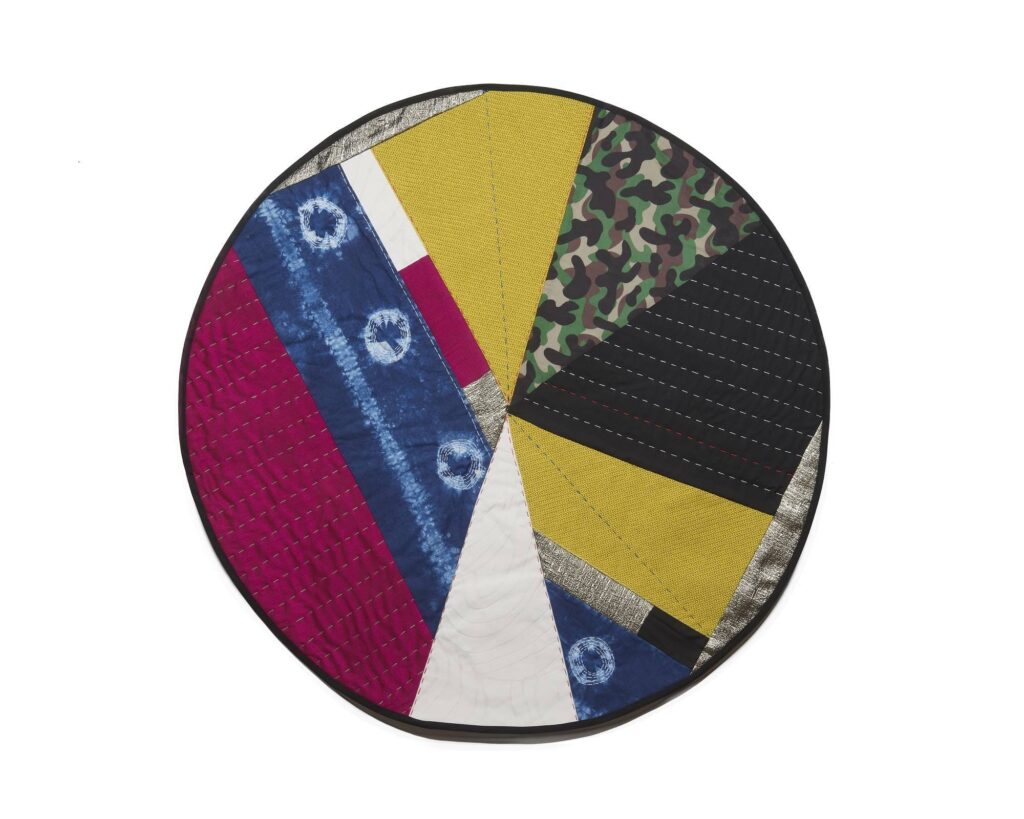
XY Shield, 2019
Indigo dyed cotton, upholstery fabric, cotton and silk
42 x42 in.
Adia Millett, originally from Los Angeles, California received her MFA from the California Institute of the Arts. In 2001, she moved to New York City for the prestigious Whitney Museum Independent Study Program, followed by the Studio Museum in Harlem residency program.
Millett has been a standout in numerous group exhibitions including the well-received “Greater New York” show at PS1 in Long Island City, New York and “Freestyle” at the Studio Museum in Harlem, New York. Her work has been featured in exhibitions at the Barbican Gallery in London; The Craft and Folk Museum in LA; The New Museum of Contemporary Art, New York; The Museum of Contemporary Art, Atlanta; The Santa Monica Museum of Art; and The Contemporary Art Center, New Orleans. Millett has taught as an artist in residence at Columbia College in Chicago, UC Santa Cruz, Cooper Union in NY, and California College of the Arts. Millett currently lives and works in Oakland.
